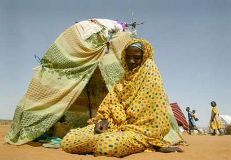Sudan talks to resume with little incentive for deal
By Amil Khan
CAIRO, Oct 20 (Reuters) – Sudan’s government and western rebels are unlikely to reach a deal to resolve the Darfur crisis at talks starting on Thursday as both sides have an interest in dragging the peace process out, say analysts.
 Delegations from the two sides will meet in the Nigerian capital Abuja under African Union sponsorship to seek a political solution to the conflict, which the United Nations says has caused one of world’s worst humanitarian crises.
Delegations from the two sides will meet in the Nigerian capital Abuja under African Union sponsorship to seek a political solution to the conflict, which the United Nations says has caused one of world’s worst humanitarian crises.
John Prendergast, Africa programme director at the think tank International Crisis Group (ICG), said the chances of reaching a final peace deal at the talks were “non-existent”.
“The political will is just not there,” he told Reuters by telephone from New York.
Prendergast said the Darfur rebels were content to wait and see what concessions southern rebels would gain from the government in an expected deal to end a separate, two-decade-old conflict in the south of Africa’s largest country.
Two Darfur rebel groups launched a revolt in western Sudan in early 2003 after years of skirmishes between mainly African farmers and Arab nomads over land. They accuse the government of arming Arab militias, known as Janjaweed, to crush them and their civilian sympathisers, a charge Khartoum denies.
The conflict has driven 1.5 million people from their homes and the United Nations estimates that 70,000 people have died from malnutrition and disease in the last seven months alone.
The government, heavily criticised over the crisis, aims to limit international condemnation by showing its willingness to negotiate with the Darfur rebels and is trying to draw out the negotiations for as long as possible, Prendergast said.
“By entering a conflict resolution process the government has succeeded in engaging the international community in bringing the two sides together, instead of taking punitive measures against it,” he added.
WAIT AND SEE
Khartoum may also want to wait to see whether President George W. Bush, whose administration has led a campaign threatening sanctions against Sudan over Darfur, wins re-election on Nov. 2.
Andrew Marshall, deputy director of the Centre for Humanitarian Dialogue in Geneva, said that to make any progress the Abuja talks had to concentrate on the underlying causes of the conflict.
“If the talks start by dealing with political issues there may be a marginal movement forward,” said Marshall, who will be present at the talks.
Marshall said those issues included decentralisation of power, political marginalisation of the people of Darfur and lack of development in the remote region.
He added that the previous round of talks in Abuja in September collapsed because of a badly designed agenda that started with contentious, “deal-breaking” issues.
“Deal-breaking security issues are a bad place to start,” he said. It is unclear what the agenda will be, he added.
Khartoum and the rebels have consistently accused each other of violating an April ceasefire. A U.N. official in Khartoum said on Wednesday the international organisation had received reports of heavy bombardment in north Darfur.
An African Union official close to the negotiations told Reuters there had been consultations between rebels and the government to resolve the issues which led to the collapse of the last round of talks.
“Problems in the last round of talks revolved around rebel demands for a no-fly zone and disarmament of the Janjaweed and government demands for all rebels to disarm,” he said.
“The impression we get is that the rebels and the government will go into the talks with more flexible position … We are optimistic talks will succeed but we will only know when we reach Abuja,” he added.
